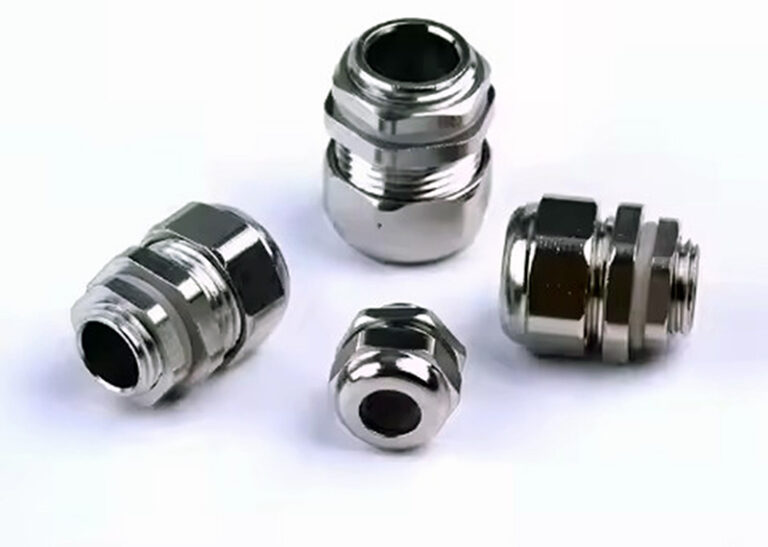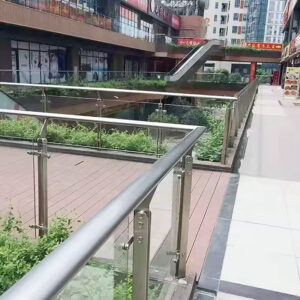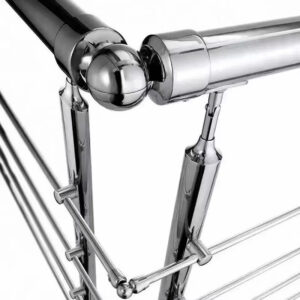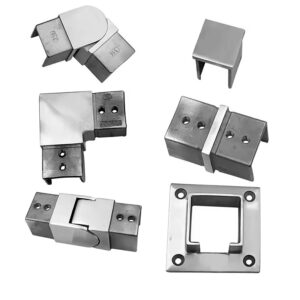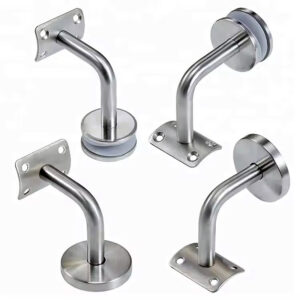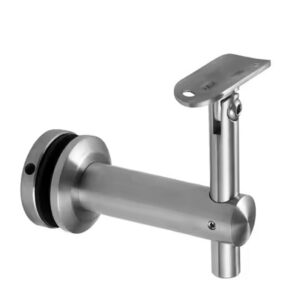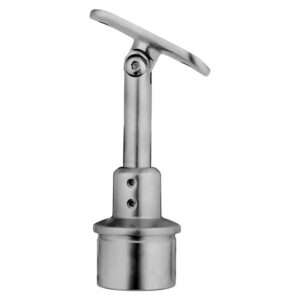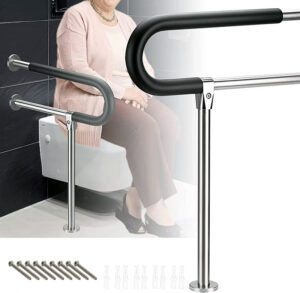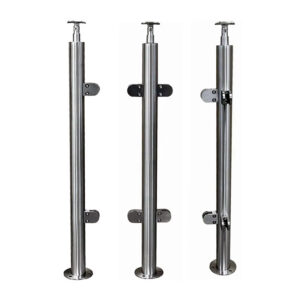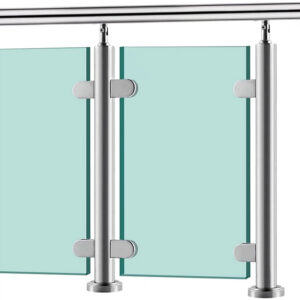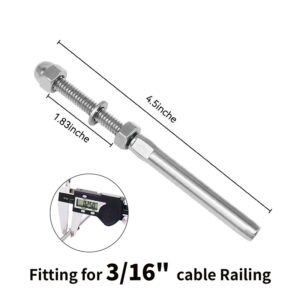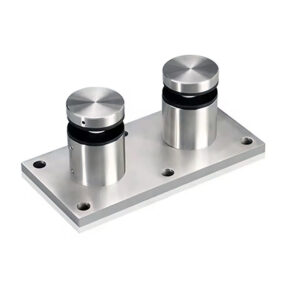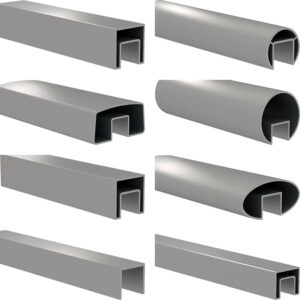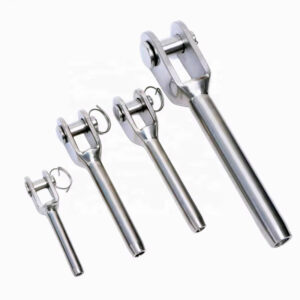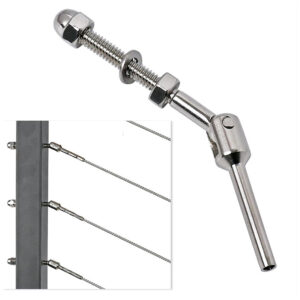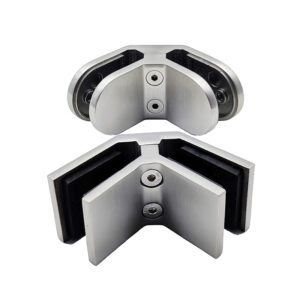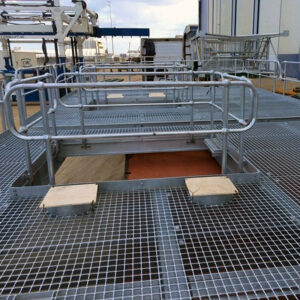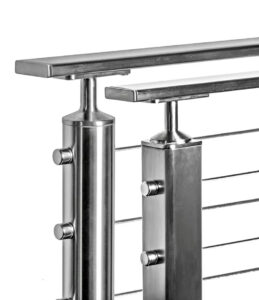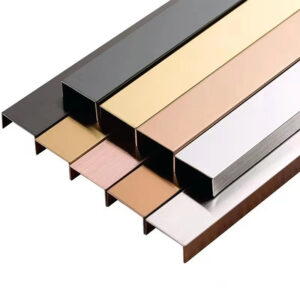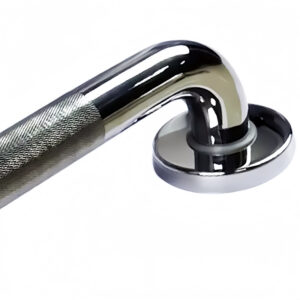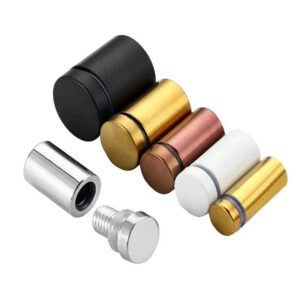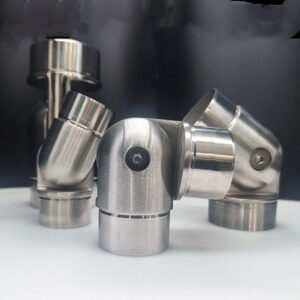Cable railing systems look clean and modern, but the devil’s in the details—specifically, how cables pass through posts and terminate at connection points. Poor cable pass-through fittings create installation headaches, maintenance nightmares, and safety concerns that cost real money. After 23 years manufacturing stainless steel hardware, we’ve learned what separates reliable cable pass-through systems from the problems that keep contractors awake at night.
Understanding Cable Pass-Through Fitting Systems
Core Components and Design Principles
Cable pass-through fittings serve as the critical interface between tensioned cables and structural posts. These precision-engineered components must handle dynamic loads while maintaining clean aesthetics and long-term reliability.
Essential System Components:
- Through-post cable guides: Precision-drilled sleeves that prevent cable wear inside posts
- Terminal fittings: End connections that distribute cable tension across mounting surfaces
- Tensioning hardware: Adjustable components for proper cable pre-load and maintenance
- Sealing systems: Weather protection for interior cable pathways
- Mounting brackets: Structural connections between fittings and support posts
Material Specifications for Reliability:
Cable pass-through fittings typically use 316L stainless steel for marine applications and 304 stainless for standard commercial installations. The L-grade designation indicates low carbon content, reducing carbide precipitation that can cause corrosion in welded assemblies.
| Material Grade | Applications | Corrosion Resistance | Cost Factor |
|---|---|---|---|
| 304 Stainless | Interior, standard exterior | Good | Baseline |
| 316 Stainless | Coastal, industrial environments | Excellent | 15-20% premium |
| 316L Marine Grade | Direct saltwater exposure | Superior | 25-30% premium |
| Custom Alloys | Specialized chemical exposure | Application-specific | Project-dependent |
▶ Get Material Selection Guide ◀
Pass-Through Fitting Fabrication and Precision Requirements
Manufacturing quality directly impacts installation success and long-term performance. Pass-through fitting fabrication 316L requires precise tolerances to ensure proper cable alignment and prevent stress concentration points.
Critical Manufacturing Specifications:
- Hole diameter tolerance: ±0.002″ to prevent cable binding
- Surface finish: 32 RMS minimum to reduce cable wear
- Thread specifications: Class 2A/2B for consistent assembly
- Heat treatment: Solution annealing for optimal corrosion resistance
Commercial pass-through systems demand consistent quality across large quantities. Our precision pass-through hardware manufacturing process includes incoming material certification, machining verification, and final assembly testing.
Technical Performance Standards
Load Capacity and Safety Factors
Cable railing systems must meet specific load requirements outlined in building codes. Pass-through fittings represent critical load transfer points requiring appropriate safety factors.
| Application Type | Design Load (lbs) | Safety Factor | Fitting Specification |
|---|---|---|---|
| Residential interior | 200 | 4:1 | 800 lb test minimum |
| Commercial | 250 | 4:1 | 1000 lb test minimum |
| Industrial/Public | 300 | 5:1 | 1500 lb test minimum |
| Marine environments | 250+ | 6:1 | 1500+ lb test minimum |
Installation Specifications
Proper installation determines system longevity and performance. Cable pass-through fittings require specific installation procedures to achieve design load capacity.
Pre-Installation Requirements:
- Post material verification and wall thickness confirmation
- Hole drilling with appropriate cutting speeds for stainless steel
- Deburring and cleaning of all cable pathways
- Thread preparation using appropriate lubricants
Assembly Torque Specifications:
- Terminal fittings: 25-30 ft-lbs with anti-seize compound
- Through-post components: Hand-tight plus 1/4 turn
- Tensioning hardware: Per manufacturer specifications (typically 15-20 ft-lbs)
Real-World Applications and Performance Data
Marine Grade Pass-Through Cable ODM Projects
Coastal installations present the harshest environment for cable pass-through fittings. Marine grade pass-through cable ODM solutions require specialized materials and protective coatings.
Case Study – Waterfront Resort Deck System:
- Location: Atlantic coast, direct saltwater exposure
- Configuration: 150 linear feet of cable railing, 40 posts
- Material: 316L stainless with electropolished finish
- Performance: 8 years service with zero corrosion-related failures
- Maintenance: Annual inspection, tensioning adjustment as needed
“Marine environments demand the highest quality materials and precise manufacturing. Generic fittings fail within 2-3 years in direct saltwater exposure.” —Marine Construction Industry Report
▶ Discuss Your Marine Project ◀
Commercial Pass-Through Systems
Large commercial installations benefit from standardized components and systematic installation procedures. Commercial pass-through systems emphasize consistency and efficiency across multiple building phases.
High-Rise Office Complex Implementation:
- Scope: 12 floors, interior atrium railings
- Components: 200 pass-through assemblies, standardized post mounting
- Installation time: 40% reduction vs. custom fabrication
- Quality control: Zero rework required due to precision manufacturing
- Cost impact: 15% project savings through standardization
Custom Pass-Through Manufacturing Solutions
Some projects require specialized solutions beyond standard product lines. Custom pass-through manufacturing addresses unique structural requirements, aesthetic specifications, or environmental conditions.
Industrial Facility – Chemical Processing Plant:
- Requirements: Specialized corrosion resistance, easy decontamination
- Material: 316L with special surface treatments
- Testing: Salt spray testing to 2000+ hours
- Result: Installation completed on schedule with 10-year maintenance agreement
| Custom Solution Type | Lead Time | Minimum Quantity | Applications |
|---|---|---|---|
| Material upgrades | 2-3 weeks | 50 pieces | Harsh environments |
| Dimensional modifications | 3-4 weeks | 100 pieces | Unique post configurations |
| Special finishes | 4-5 weeks | Variable | Aesthetic requirements |
| Complete system design | 6-8 weeks | Project-specific | New construction integration |
Installation Best Practices and Support
Modular System Integration
Modern cable pass-through fittings use modular design principles that simplify inventory management and reduce installation complexity. Standardized components work across multiple post types and cable configurations.
Modular System Benefits:
- Reduced inventory requirements (30-40% fewer SKUs)
- Simplified field assembly procedures
- Interchangeable components for maintenance
- Consistent quality across installation phases
- Predictable installation timelines
Technical Support and Engineering Assistance
Complex installations benefit from engineering support during design and installation phases. Our 23 years of manufacturing experience provides practical guidance for challenging applications.
Available Support Services:
- Load calculation verification and code compliance review
- Installation procedure development and training
- Custom component design and prototyping
- Quality control inspection and testing protocols
- Long-term maintenance planning and spare parts programs
Quality Control and Performance Verification
Manufacturing precision directly impacts field performance. Quality control procedures verify dimensional accuracy, material properties, and assembly compatibility.
Standard QC Procedures:
- Incoming material certification review
- Dimensional inspection using calibrated equipment
- Surface finish verification and documentation
- Thread inspection with go/no-go gauges
- Final assembly testing with calibrated torque equipment
Frequently Asked Questions
Q: How do I select the right material grade for coastal installations?
A: For direct saltwater exposure, specify 316L marine grade stainless steel with electropolished finish. Standard 316 stainless works for locations more than 1 mile from saltwater. Consider local environmental factors including industrial pollution and cleaning chemical exposure.
Q: What causes cable pass-through fittings to fail prematurely?
A: Common failure modes include improper material selection, inadequate surface finish causing cable wear, incorrect installation torque, and lack of regular maintenance. Precision pass-through hardware with appropriate materials typically provides 15-20 years service life in normal environments.
Q: Can I mix manufacturers’ components in a single cable railing system?
A: Mixing components introduces compatibility risks and complicates warranty coverage. Standardizing on a single manufacturer’s system ensures proper fit, consistent quality, and simplified maintenance. Our modular approach provides flexibility within a compatible component family.
Q: What installation tools are required for cable pass-through fittings?
A: Standard installation requires calibrated torque wrenches, appropriate drill bits for stainless steel, deburring tools, and anti-seize lubricants. Complex installations may require cable tensioning equipment and specialized alignment tools.
Q: How often do cable systems require maintenance and adjustment?
A: Initial settling typically occurs within 6 months, requiring tension adjustment. Afterward, annual inspections with adjustments as needed maintain proper system performance. Marine environments may require more frequent inspection due to environmental loading.
Q: What’s the difference between standard and custom pass-through manufacturing?
A: Standard components offer cost advantages and shorter lead times for typical installations. Custom pass-through manufacturing addresses unique requirements including special materials, modified dimensions, or integrated mounting systems. Lead times and minimum quantities vary based on modification complexity.
Proven Manufacturing Experience
Esang Metal brings 23 years of stainless steel hardware manufacturing experience to cable pass-through fitting solutions. Our precision manufacturing capabilities, combined with comprehensive quality control procedures, deliver reliable components that perform as specified.
Performance advantages include:
- Dimensional consistency reducing installation time and rework
- Material traceability ensuring appropriate grades for specific applications
- Surface finish quality minimizing cable wear and extending system life
- Modular design philosophy simplifying inventory and maintenance
- Technical support backed by real-world installation experience
“Reliable cable pass-through fittings form the foundation of successful cable railing installations. Quality manufacturing and appropriate material selection prevent the costly failures that damage contractor reputations.” —National Association of Railing Contractors
Making the Right Choice
Cable pass-through fittings represent a critical system component where quality directly impacts long-term performance and maintenance costs. Precision manufacturing, appropriate materials, and proven design principles deliver the reliability that contractors and building owners expect.
Our 23 years of manufacturing experience demonstrate that successful cable railing systems require attention to detail at every component level. From pass-through fitting fabrication 316L for marine applications to precision pass-through hardware for commercial installations, quality manufacturing makes the difference between systems that work and systems that cause problems.
Ready to specify cable pass-through fittings that deliver reliable performance? Our engineering team can help you select the right components and materials for your specific application requirements.
